



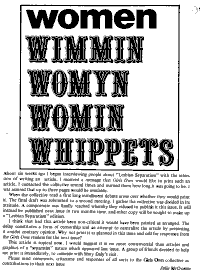
About six weeks ago I began interviewing people about "Lesbian Separatism" with the intention of writing an article. I received a message that Girls Own would like to print such an article. I contacted the collective several times and warned them how long it was going to be. I was assured that up to three pages would be available.
When the collective read a first long installment debate arose over whether they would print it. The final draft was submitted to a second meeting. I gather the collective was divided in its attitude. A compromise was finally reached whereby they refused to publish it this issue. It will instead be published next issue in two months time, and other copy will be sought to make up a "Lesbian Separatism" edition.
I think that had this article been non-critical it would have been printed as arranged. The delay constitutes a form of censorship and an attempt to neutralize the article by presenting it amidst contrary opinion. Why not print it as planned in this issue and call for responses from the Girls Own readers for the next issue?
This article is topical now. I would suggest it is no more controversial than articles and graphics of a "separatist" nature which appeared last issue. A group of friends decided to help me print it immediately, to coincide with Mary Daly's visit.
Please send comments, criticisms and responses of all sorts to the Girls Own collective as contributions to their next issue
Julie McCrossin
This article is a response to the increasing sense of disquiet I've been experiencing about some ideas and attitudes around the feminist ghetto. I am concerned about the implications of a whole series of things I've heard or seen written such as: 'men are mutants'; 'its know use putting energy into men'; 'can heterosexual women be feminists'; 'porn is violence against women'; 'smash the sex shops'; 'castrate all rapists'; 'dead men don't rape'; 'kill them in their cots'; etc. Was there any relationship between these ideas? What could I read to explain to me the analysis behind them?
The crunch came when I woke up one morning to hear Fred Nile of the Festival Of Light praising the actions of Brisbane Uni feminists which lead to the removal of girlie magazines from the university newsagent. Fred was calling for community response to the "nauseating filth" of Caligula. Soon after some women are alleged by police to have thrown paint at the screen during a session. A remembered my misgivings over the tone and ideas behind the Reclaim The Night marches which focused on sex shops. What exactly is the difference between the Festival of Light's position and ours? Fred Nile says Caligula degrades women too. Do we advocate censorship? Can we afford ambiguity at a public level?
I decided to write an article to spell out my misgivings and to invite people to respond. I have talked to lots of people and done some scattered reading. My aim is to initiate written and open debate of ideas, not to have a go at any one.
This article has become an examination of "Lesbian Separatism" because it was to that spectrum of ideas that I traced many of the tendencies I find so unpalatable.
Why be an anarchist? Why incorporate a body of ideas into the way you view the world? Political analysis gives us insight into our experiences and puts them into a context by helping us to understand the way the world works and its effects on us. Its aim is to help us work out tactics to change what we don't like.
I remember my first contact with women's movement ideas at Sydney University in c. 1972 sex role conditioning; women were not naturally inferior; monogamous, heterosexual marriage was not the only way. A little later I got involved with Gay Liberation it was alright to feel sexual feelings for your own sex!
What was the effect of these ideas? of this new found analysis? ..recognition, things clicking into place, relief, encouragement. It was liberating information. The world now seemed a bigger place, full of more choices. My brother's refusal to do any washing up because it would set a dangerous precedent, may have been a funny line, but it was unfair as I'd always felt. There were lots of women who were aroused by their own sex - whats more, the numbers appeared to be increasing. . . . After "The Loudest Whisper" and the evasions of the school chaplain, this was news indeed!
I had similar mind expanding sensation when I was first introduced to anarchist ideas. Alexander Berkman's indictment of state violence and Emma Goldman's criticism of the way the Russian Revolution developed were good news to this left-winger who had always felt uneasy with the concept of the dictatorship of the proletariat. To hear of a form of organization that didn't involve leaders or hierarchies or forced obedience to party lines of any colour, offered an ideal worth fighting for.
When I started to think about why I found the "lesbian separatist" ideas floating around town so unpalatable, I realized it was more than the absurdity of the mutant theory, more than the prejudice and authoritarianism of dismissing half the human race, more than the reverse sexism it was the hopelessness such ideas engendered.
These ideas have the exact opposite effect to the original women's liberation concepts. They are restricting. confining, inward turning and exclusive, not only of men, but of many women too. If you believe men are incapable of change, the future is indeed frightening.
The tactics such an analysis gives rise to reflect this hopeless quality - from no support to issues involving men, no involvement with male children, mistrust of heterosexual women; through to castration and death lists.
It would seem that "lesbian separatism" is a broad term meaning different things to different people. Women I spoke to in Sydney ranged in their interpretations from "not wanting to put energy into men", to consideration of ways to eliminate men all together. In Britain the lines have been more clearly drawn. Ludo McFingers gives a succinct description of the development of separatist threads up to 1978 in London in her article "The Way of All Separatists" in the Blatant Lesbianism. She writes how urban separatists squatting in London in the early 70's eventually moved into the country and became isolated and politically impotent. She writes "separatism as the extreme wing of radical feminism has been superceded by the revolutionary feminists, who call for the struggle to be taken back into the streets . . . They hate men, see women as a sex class, support biological determinism, reject reformism and despise the left."(1)
Here are all the ideas I associate with the term "lesbian separatist". I understand there are some women who call themselves "separatist" who may only agree with parts of the whole spectrum.
Separatists assert that patriarchy is the fundamental cause of all oppression in our society. It is the sum total of means by which men maintain dominance over women. In a patriarchal analysis men are identified as the enemy and the creators of all other divisions and inequalities throughout history. "Women's oppression predates and is the root cause of all others."( 2) I get the impression that all men, each individual man, benefits and thus all men are responsible. All men are considered guilty and all women are considered innocent.
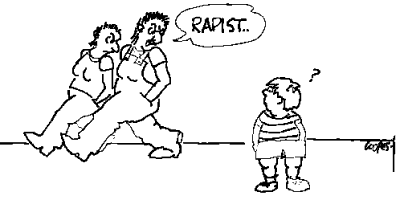 A Sydney woman I interviewed felt that there had been two camps from the word go - socialist feminists, who see economic causes as the root of our oppression, and radical feminists, who see patriarchy as the cause. She said "Women have never had any power and have always been ruled by men. Out of that comes class, race and economic divisions. Women have no say and have always been oppressed in some way."
A Sydney woman I interviewed felt that there had been two camps from the word go - socialist feminists, who see economic causes as the root of our oppression, and radical feminists, who see patriarchy as the cause. She said "Women have never had any power and have always been ruled by men. Out of that comes class, race and economic divisions. Women have no say and have always been oppressed in some way."
As a British woman puts it "I know what it is and who it is that oppresses me most, each time I walk outside my front door. Its not capitalism, its not class structure, its not other women, its men . . . No woman is to blame because none of us had the power to create these structures."( 3)
"Lesbian separatism" is asserting that sex/gender is the basic division in our society. All other inequalities are subordinate side-effects. Faced with a complex world, such a suggestion may be appealing in its simplicity. It invites direct and radical solutions. But it just isn't that simple. Class and race are equally significant. To fully understand a society we need to work out the relationship between sex, class and race based divisions, and to consider them in the context of the particular culture and historical period.
Any movement for social change which chooses to focus on one basis of oppression and to downgrade the significance of the others, is bound to be misleading and oppressive itself.
The impact of feminism this century has been to point out to working class based movements their failure to fully acknowledge the significance and to fight to remove sex based oppression. Separatist ideas appear to have swung the other way. It is easier to see the man whistling from the car than it is to see class structure. But I am often aware when I walk out my front door of the advantages I experience as a middle class white in Australia. Socio-economic background and racial origin, as well as gender, fundamentally influence the educational opportunities, work options and life expectations of women and men.
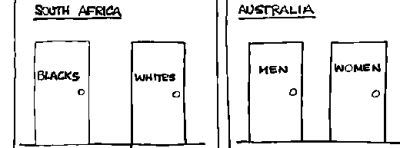 I can only attempt to understand the problems of a black woman struggling to help free her people from white, imperialist domination and to create a new more equal society - whether its in Australia or South Africa. I wouldn't presume to tell her what her priorities should be. But it is clear that the maintenance of her peoples' culture and identity, and the opportunity for economic independence, are necessary for her full liberation as a woman.
I can only attempt to understand the problems of a black woman struggling to help free her people from white, imperialist domination and to create a new more equal society - whether its in Australia or South Africa. I wouldn't presume to tell her what her priorities should be. But it is clear that the maintenance of her peoples' culture and identity, and the opportunity for economic independence, are necessary for her full liberation as a woman.
There is a thread running through "Lesbian separatist" thought that attempts to absolve women from any responsibility for the way the world is, "No woman is to blame because none of us had the power to create these structures." This view of history delegates women to a politically passive and impotent role. It reveals how misleading an analysis is which ignores other significant factors. Female members of ruling elites or dominant races have influenced and actively participated in the economic lives of societies.
For some "separatists" involvement in groups who are active around issues which are not specifically related to women, is at best a waste of time, and at worst collusion with the enemy.
This attitude can lead "separatist" women to exclude themselves from participation in struggles or around causes in which men are active. Thus the opportunity to become aware of common problems or the way other people see things is lost. Many of my political ideas and attitudes to people have been moulded through active participation. Separatist ideas would seem to lead inevitably to a narrowing of outlook and to facilitate the maintenance of pure and rigid views.
"Separatists" have an intense interest and make repeated references to violence by men against women. Separatist ideas in Sydney are associated with the feminist refuge movement and rape crisis, where women are constantly confronted by the ugliest side of male/female relationships in our community. It is argued that men use the threat of violence and particularly rape to keep their power over women. "All men benefit from the sex class system based on men's power over women, whether or not they all rape, murder, mutilate and attack women."( 4)
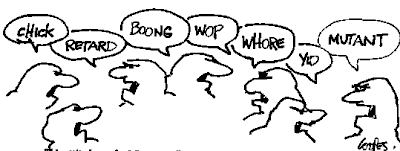 It is argued that each individual man must be held responsible "We suffer from male exceptions. It is too frightening for women to start seeing 'their' men as the enemy - the woman- batterer-mutilator-disemboweling-murderer, so it is more comfortable to believe that these men are 'just a few maniacs"'.( 5)
It is argued that each individual man must be held responsible "We suffer from male exceptions. It is too frightening for women to start seeing 'their' men as the enemy - the woman- batterer-mutilator-disemboweling-murderer, so it is more comfortable to believe that these men are 'just a few maniacs"'.( 5)
Two Sydney women I interviewed had a very vivid sense of imminent threat from men "We are living in a state of civil war. In no society for over 5000 years have women had freedom to move."
It is felt that male violence towards women needs to be talked about and recorded. As Pam Stein wrote in last issue of Girls Own "This is what we should have been talking about at the conference - how men are raping, beating and murdering women all over the world - and how we as black, white or green women should be eliminating our murderers."
Rape is seen as the ultimate weapon men use. Susan Brownmiller in Against Our Will; Men, Women and RAPE sums up this view I think, "From prehistoric times to the present, I believe, rape has played a critical function. It is nothing more or less than a conscious process of intimidation by which all men keep all women in a state of fear."
Several of the women I interviewed suggested to me that men had in fact been trying to kill women for centuries, but had held back because of women's role in giving birth, Current experiments by scientists with test-tube babies, genetic engineering and cloning concerned these women as attempts to eradicate the necessity for women at all.
Emphasis on the responsibility of individual men for the communal male crimes of patriarchy implies the possibility of punishment or revenge. I am drawn to an approach which does not focus on the individual but rather on the forces that shape peoples' lives. I don't support locking people in jails or capital punishment as a response to violent behaviour. I do support attempts to deal with the causes, such as social inequality, deprivation, unemployment and alcoholism.
I do think that violence by men towards women does have special characteristics, but I don't think that it can be divorced from the general violence of all types within our society. Women as well as men support state violence from police, prison officers, the army and teachers in schools. Violence by the state far exceeds the acts of any individuals.
The underlying premise of "lesbian separatism" is that men cannot or will not change. Any attempts in that area we seen as a waste of time.
The general feeling I get talking to separatists is that men are seen as quite different from women. This perception of men as alien to women is reflected in their choice of language. Despite seeing class and race based divisions in our society as plots by me to divide women, they use these terms to reinforce their sense of difference from men. An example is Pam's disturbing assertion in the last Girls Own,"I am racist to the extent that I believe there are two races - women and men, and I hate the men who are trying to destroy our race". And a British example, "I see a sex-class system where men are the oppressor class (enemy). Women are a class and there is a class war between men and women."( 6)
Two women I spoke to felt that social conditioning processes and vested interest in the current system may not be enough to explain what they believe is men's unwillingness or refusal to change. It is in this context that the suggestion of biological determinism emerges. As I understand it the idea was first floated by Valerie Solanas in The SCUM Manifesto (Society for Cutting Up Men) in 1968.
The suggestion appears to be that while women have XX chromosomes men have lost a bit and are XY. Thus they have mutated and are essentially different to women. As one woman put it to me, the mutation theory was "a bit of a joke but it seemed pretty logical. Women go through masses of startling changes all the time, why can't they?"
No-one I talked to was prepared to say they definitely agreed with biological determinism.
However I gather it is quote common in some circles to hear men referred to as "mutants". To coin derogatory names for groups of people we fear or despise is a common practice in our society. It enables the user of such terms to feel different from the object of these feelings, But do women who call men "mutants" actually see biological determinism as a fact? If so what are the tactical implications of such a belief? As Ludo comments in her article, about the British situation, "Revolutionary feminism emerged ... at times embarrassed about some of the potentially fascist overtones of biological determinism . . . "
Several women told me of "jokes" they had heard around the ghetto about killing boy babies in their cots, the assumption apparently being that they were doomed from birth. This is an implied reference to biological determinism. Such "jokes" alienate other women and seem alarmingly without hope. It also seems a bit disturbed to me.
For some women "separatism" involves being "woman-identified" - "separatism" has always been defined in Australia by negative outsiders as separation from men. I see it from a positive side. All my emotions, love and work are with women." Another woman said, "Separatism is about making decisions on where you put your energy, making decisions about tactics for social change - not about killing babies. Its continual choices."
Another woman said that men had always sold women out in political struggles and could not be trusted, "I can't envisage any revolutionary situation that is going to give women freedom. No vision is worth fighting for while men are involved." From Britain, "It really frightens me when I hear women talking about changing men by working with them against capitalism". (7)
Thus for many women "lesbian separatism" involves excluding men from your social life and working politically with women-only for women-only. This, therefore, discourages or precludes involvement with trade unions and mixed left wing groups.
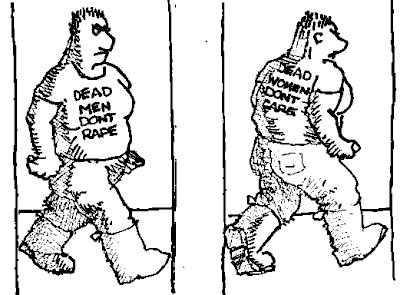 Some women talk about the possible need for violent confrontation with men to overthrow their power. For a few it has involved consideration of killing men in large numbers. I feel that this idea or fantasy has arisen from feelings of isolation connected with a ghetto lifestyle, a preoccupation with men's violence towards women, impatience for change and the fear that merely separating off will not be enough to force it. It relies on an analysis which identifies men as the cause of all the worlds problems. This ultimate solution is linked to biological determinism which asserts that men are incapable of change.
Some women talk about the possible need for violent confrontation with men to overthrow their power. For a few it has involved consideration of killing men in large numbers. I feel that this idea or fantasy has arisen from feelings of isolation connected with a ghetto lifestyle, a preoccupation with men's violence towards women, impatience for change and the fear that merely separating off will not be enough to force it. It relies on an analysis which identifies men as the cause of all the worlds problems. This ultimate solution is linked to biological determinism which asserts that men are incapable of change.
What does one say about such ideas? It is so disturbing to see such authoritarian madness emerging in a context that purports to be part of feminist or women's liberationist thought. Two women I spoke to wanted a world without men and had contemplated killing them - but they feared women would not survive a direct confrontation. They also had reservations because a lot of women wouldn't want it. One woman said, "If I want to exterminate them all, do I want to kill my father? I'd find it hard. One reason is I've had good times with him." Both these women didn't like the idea of killing anyone themselves.
An Irish woman writes, "the idea of killing and/or physically challenging male hatred of women is paralyzingly scary I find it much easier to contemplate the idea of implanting all men with haemophilia or something . . . the process of violence could so brutalize women that we might use our power against each other . . . I think that having lived in Ireland, I'm very wary of traditional revolutionary tactics like bombing, kneecapping and the like and so I'm continually aware of the yawning gulf between theory and practice that seems to pervade my thinking."( 8)
Tension exists in "lesbian separatist" ideas between fantasy and concrete analysis and strategy. The two at times merge in a way I find confusing. Perhaps I just find it hard to understand how someone could be serious about some of this stuff. I was told of the need to exercise my "female imagination". At times it seemed a case of either you feel it or you don't.
"The release of a fantasy world of imagining living in a world without men keeps me going from day to day ... the fantasy of living in a world without fear."( 9) The woman who said this to me was very unwilling to discuss how the men would be removed and where to - yet it seemed a point that needed to be cleared up. Another woman said, "Maleness and death are linked. Men have killed in actual and subtle ways . . . Death may even be a patriarchal myth. Men are so linked with death they may have killed our life spark. We have to rely on fantasy because it hasn't happened before, for example, women's culture. If you have a fantasy there is a possibility it could happen."
It was suggested to me that the female principle is life giving, whereas the male is linked to death. This idea was promoted in bold type on the back cover of the last Girls Own,"War is the assertion of death over life; of the patriarchy over the female principle." The style and use of language and capital letters on that page were reminiscent of literature from a religious sect.
There are spiritual ideas sometimes associated with "lesbian separatism" which involve a vision of the creative potential of a female culture and future.
In 1976 a number of women in Melbourne distributed a long essay entitled Women's Liberation; The Problems and The Potential. Part of their comments on "separatism" were, "It can be argued that developing a separatist women-only group and/or lifestyle based on counter- cultural values will only intensify the conflicts between women in this society, and perpetuate the myth that lesbianism is the ultimate feminism or the ultimate personal solution for all women . . . No-one questions the right of any woman to live how, where and with whom she pleases, but what is being questioned here is the right of any woman to put forward a particular lifestyle or type of relationship and say that this is what real feminists should be doing or that this is the best/only strategy for achieving women's liberation."( 10)
I associate the idea that lesbianism is the "ultimate feminism" with "lesbian separatism". For some women the slogan has changed from "Every woman can be a lesbian" to "Every woman should be a lesbian." A British view, "We should refuse to be fucked by men. We should be celibate or lesbian . . . For me fighting patriarchy is primary and the all pervasive ideology of heterosexuality is one of the biggest weapons men have." (11) Another British woman, "I do think that heterosexual women collaborate in their own and other women's oppression."( 12)
From Blatant Lesbianism, "You want all women to be lesbian? Well, obviously yes .... You reach a political position, one that you believe to be the best and that offers the ultimate solutions." (13) And later in the same Sydney magazine, ". . . its the idea of lesbianism being a conscious political choice, giving up heterosexual protection and privilege and committing our primary energies - emotional intellectual and sexual - to other women as the most effective means of undermining the male-dominated system that oppresses all women - its this idea that is challenging and therefore threatening."( 14)
As a feminist and a lesbian I have never felt comfortable with this line on lesbianism. It doesn't ring true with my experience of how and why women become lesbians, and it doesn't appear to give enough significance to sexual arousal and desire the feelings that lead so many women into bed together despite the enormous discouraging messages society puts out.
The general attitude that lesbianism is the more acceptable sexual preference is pervasive around the feminist ghetto. As a short term response to years of external and internalized oppression for being a lesbian, the desire for all women to be lesbians, and hatred of men, is understandable. When the lid was finally lifted off all my resentments and bottled up guilt and fear, the rush was overwhelming. But to justify such feelings in quasi political terms is to promote a new set of oppressive and restrictive attitudes.
I was attracted by Gay Liberation and Women's liberation because they freed me from a sexual norm, a "right way to fuck". That women should feel group pressure to conform to a new norm, or feel excluded or mistrusted because they fuck with men, seems an ironic parody of our original intent. Such an approach appears to disregard the many elements that influence the intangible area of sexual arousal.
Also it was suggested to me that lesbianism as a political issue has not been taken up by the women's movement in the same way as abortion, equal pay etc. It is said that feminists fear losing credibility by giving the impression that we're all a bunch of lesbians. I think that in the early 70's this anxiety did exist, but that things have changed dramatically since then. These days I think it is heterosexual women who often feel one out at a feminist gathering and unable to discuss any problems or pleasures they may be experiencing in their sexual relationships.
I think that lesbianism as an issue has been fully integrated into the women's movement. Perhaps the social and other supports the movement provides for lesbians explains to some extent the recent lack of outward action in the community. Ironically many separatist women appear to have boycotted recent gay marches and demonstrations - because men are involved.
The last comment in this part is that I don't like the use of the word "heterosexism". This word is used to describe the conditioned patterns of behaviour in sexual relationships which represent the norm in society - heterosexual, monogamous marriage - involving characteristics such as a dominant and a submissive role, jealousy, etc. The term "heterosexism" implies a necessary link between these conditioned patterns and heterosexuality. Clearly these patterns emerge in lesbian and homosexual relationships. It is the patterns some of us want to change. I'm sure we just used to call it plain old "sexism".
As the Melbourne women say, "It has become apparent that many relationships between women have taken downright reactionary and oppressive forms, simply because, at this stage, all the shit that's in the system about roles and sexuality and power, manifests itself in many of the same sorts of ways as it does in heterosexual relationships."( 15)
It is not just the influence of "Lesbian Separatist" ideas. There is a body of attitudes I associate with these ideas, which are hard to define simply because they are never directly stated.
The Melbourne women had some comments about what has happened to the original women's liberation concept "the personal is political".
"The Personal Is Political does not mean that every single action or word is dripping with heavy political significance and that therefore one must never act unless one has carefully worked out whether it is 'feminist' or not. Quite clearly this leads to a tyrannical situation where women are unable to be themselves (one of the key aims of Women's Liberation) ..... Instead of the slogan being a liberating insight ..... it has become an oppressive idea preventing thought, action and initiative (particularly since no area of personal life was able to be one's own anymore). "(16)
Is feminism to be a liberating body of ideas whose general thrust is to understand our society through opening things up for discussion and debate? Or a new set of rules to be used to identify and label the ideologically unsound? Surely the aim is to open new avenues, not to make further restrictions.
Such a view of history denies cultural differences and historical context. Historical perspective is essential for anyone interested in social change. You need a sense of yourself as part of a tradition of dissent and agitation in order to develop a realistic set of expectations.
I think that "Lesbian Separatist" ideas and attitudes have grown from an oversimplified analysis and an underestimation of what had to change. It is as if women's liberation began in 1968 and they are impatient because it hasn't happened yet. I can remember walking around uni in the early 70's talking about "the revolution" as if it were a big bang which would blow in the next few years. Now I see political struggle as a daily affair, a series of actions and reactions, advances and setbacks. The ends do not justify the means. The means we employ to achieve social change are the revolution.
Contrary to the atmosphere surrounding "Separatist" ideas, I feel that women's struggle has come a long way this century, and so has the situation for lesbians and homosexuals. We are now in a period of reaction when the gains of the last ten years are under attack. Historically movements for social change cope with internal differences while the movement is gaining ground and is on the offensive. Internal divisions and debate act as catalysts for change and advance. When the reaction sets in and we are defending our gains, we must be aware of the tendency for movements to turn in on themselves and to self-destruct. I suggest that "Separatist" ideas tend to limit the scope of political involvement for women by defining ever more strictly where feminists can put their energy. They create false divisions e.g. between lesbian and heterosexual women. Also these ideas and associated attitudes alienate women looking at feminism for the first time.
For example, many "separatists" have strong feelings about pornography. I have found some "separatists" all too ready to suggest pornography should be banned, without regard or even awareness of the struggle over censorship dating back many years.
Similarly with, what to do about rapists. Remarks such as "they should be shot" are easily made, but are women seriously arguing for the reintroduction of capital punishment? Do we want to lock more men up in jails? If so, what do we think it will achieve?
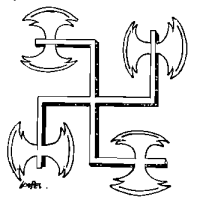 Women choosing to live their lives separate from men, whether in the city or the country, is their business. Seeing the patriarchy as the source of all oppression in the world, is one opinion. The problem comes in when the extension of these ideas leads to women feeling their credibility as feminists is suspect if they are heterosexual. And worse still, when they are reticent to admit that their children are males.
Women choosing to live their lives separate from men, whether in the city or the country, is their business. Seeing the patriarchy as the source of all oppression in the world, is one opinion. The problem comes in when the extension of these ideas leads to women feeling their credibility as feminists is suspect if they are heterosexual. And worse still, when they are reticent to admit that their children are males.
To have people feel restricted by a new "moral code" within a movement whose aim is liberation, is a problem in itself. But when ideas or slogans such as "Dead Men Don't Rape" begin to appear, the time has come to seriously look at the analysis which enables such an idea to be entertained. The implications of such a slogan are frightening. This is not the basis for a freer and more humane society.
I don't think we debate ideas often or fully enough. We tend to live in splinter ghettoes of the big ghetto called the women's movement. If we want to mix with a group of women socially, we feel we need to agree with their ideas, or at least to keep quiet. Several women have suggested to me that by writing this article I'm opening myself up for character assassinations as a means of destroying the credibility of my opinions.
I hope this article will be greeted as an attempt to open up debate. Lets try to put principles before personalities. Such an approach is based on an assumption that there is no single list of true ways of interpreting the world, and no single list of tactics to change it.
I have heard that in Italy people can have heated political disagreements but still expect you to be their friend. The distinction is drawn between the person and their ideas. A. helpful approach. After all lots of us change our ideas pretty radically as time goes by.
"It is not for us to create a plan for the future that will hold for all time. All the more surely what we contemporaries have to do is the uncompromising critical analysis of all that exists, uncompromising in the sense that it fears not its own results nor the conflict with the powers that be." Karl Marx.
1. Blatant Lesbianism. Sydney Magazine. P.10-13
2. Why We Are Revolutionary Feminists. British leaflet. July 80. P. 8.
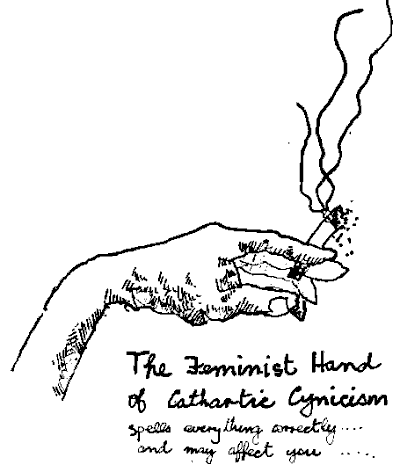 3. same as above P. 8.
3. same as above P. 8.
4. P. 6.
5. P.6.
6. P.6.
7. P.13.
8. P.3.
9. From an interview with a Sydney woman.
10. Women's Liberation The Problem and the Potential Melbourne 1976 P. 4.
11. Why We Are Revolutionary Feminists. British Leaflet. P. 13.
12. Same as above P. 3.
13 Blatant Lesbianism. P. 25.
14. Same as above. P. 45.
15. Women's Liberation: The Problem and the Potential P. 18.
16. Same as above P. 11.